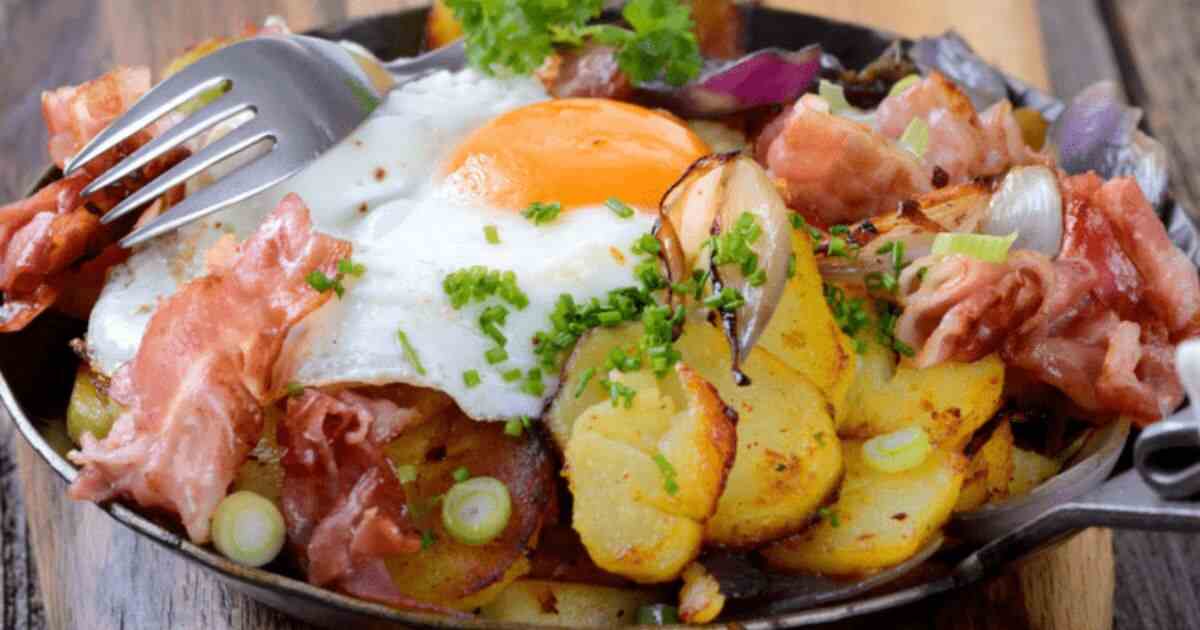German for breakfast includes traditional foods like bread, eggs, ham, and cheese. German breakfasts are known for their hearty and satisfying qualities, with a focus on savory flavors rather than sweet.
When it comes to starting your day off right, a german breakfast can provide a delicious and filling meal. In germany, breakfast is seen as the most important meal of the day and is often enjoyed as a leisurely affair with family or friends.
While germans typically don’t indulge in sweet breakfast items like pancakes or waffles, they do offer a variety of tasty options. From fresh bread and cold cuts to warm eggs and cheese, german breakfasts are sure to satisfy any appetite. In this article, we’ll explore the history and culture behind the german breakfast, as well as some popular dishes to try for yourself.

Credit: thestayathomechef.com
Why German For Breakfast?
German For Breakfast: Why German For Breakfast?
Germany is a country well-known for its efficiency, precision, and innovation. Yet, not many know about the delicious and nutritious breakfast options that germans start their day with. Here’s a closer look at why you should choose german for breakfast and the nutritional benefits that come with it.
Nutritional Benefits Of A German Breakfast: Protein And Fiber
Protein and fiber are crucial nutrients that help keep you full and provide sustained energy levels to tackle the day ahead. Germans understand the importance of starting the day with a nutritious breakfast, which is why a typical german breakfast is hearty and well-balanced.
- German breakfasts are rich in protein, thanks to the inclusion of eggs, ham, cold cuts, and cheese. Animal proteins are complete proteins, meaning they contain all essential amino acids necessary for healthy muscle growth, repair, and maintenance.
- Germans breakfast also consume a wide range of whole-grain bread and cereal options, which means they are consuming fiber-rich foods. Fiber contributes to satiety, aids in digestion, and lowers cholesterol levels.

Introduction To Famous German Bread Variations
Germany breakfast is renowned for its bread, and there are estimated to be over 3,200 different kinds of bread available. Here are some of the most popular breads that make german breakfasts exceptional:
- Roggenbrot (rye bread): This bread is made entirely using rye flour, has a robust flavor, and is slightly denser than wheat bread. It’s rich in fiber and essential vitamins, iron, and magnesium.
- Pumpernickel: This dense, dark bread is made by slow-baking rye flour mixed with sourdough starter for 16-24 hours, which gives it a sweet and slightly sour flavor. This bread has a low glycemic index, which means it is slowly absorbed into the bloodstream, keeping blood sugar levels steady.
- Brötchen (bread rolls): These small, crusty rolls are an essential component of a typical german breakfast. They pair well with tea or coffee and can be filled with various meats, cheeses, and condiments.
Choose a german breakfast to start your day off on the right track. It’s a nutritious, filling, delicious way to receive good nutrition early in the day.
German Bread: The Heart Of Breakfast
Nothing screams german for breakfast more than their delectable bread spread. Germans are well-known for their breeding approaches as they produce up to 300 types of bread! As a result, bread is the heart of breakfast in germany. In this section, we will look at the role of bread in german breakfast culture, different types of german bread, and traditional toppings and spreads on german bread that make it a delight.
Role Of Bread In German For Breakfast Culture
Germans for breakfast engage in hearty breakfast meals to kickstart their day, and bread is an essential component. This delicacy infuses the first meal of the day with a wholesome, filling, and nutritious vibe. Let’s take a look at some other roles of bread in German breakfast culture:
- Sets the foundation of energy for the day ahead.
- Provides various essential nutrients to support the human body’s biological functions.
- Bread is versatile, and it can be eaten toasted or untoasted, with a sprinkle of toppings or bare.
Different Types Of German Bread And Their Unique Characteristics
As shared earlier, germany produces over 300 varieties of bread that are unique to the country. Here are some popular german bread types:
- Vollkornbrot (whole-grain bread): This bread type is a mixture of several whole-grain flours, and it is dense, moist, and dark in colour.
- Brezen (pretzel): The pretzel is a baked good that has a unique shape. It comes in a twisted knot with a crunchy, salty crust and soft doughy interior.
- Roggenbrot (rye bread): Rye bread is a dark bread made with rye flour that provides an earthy flavour to the bread.
- Weißbrot (white bread): The white bread is the quintessential bread type, with a fluffy texture and a mild flavour.
Traditional Toppings And Spreads On German Bread
German bread is not just about the delicious bread types. There is a wide selection of toppings and spreads that can be added to make bread heavenly. Here are some traditional toppings and spreads on german bread:
- Butter: A simple yet delicious spread that goes with every bread type.
- Schmierkäse (cream cheese): A creamy cheese spread available in various flavours such as herb, onion, and garlic.
- Honig (honey): For those with a sweet tooth, honey is an excellent topping option.
- Marmelade (jam): Marmalade is a fruit preserve that comes in several flavours, such as strawberry, apricot, and plum.
The role of bread in german for breakfast culture cannot be disputed. From its nutritional value to its versatility, german bread is a delicacy that sets the day’s foundation. The variety of bread types, coupled with a wide selection of spreads and toppings, makes german bread a must-try for any breakfast lover.
Beyond Bread: German For Breakfast Classics
Experience The Unique German Breakfast Culture, Beyond Bread: German Breakfast Classics
Germany is not only famous for its beer and pretzels, but also for its diverse and delicious breakfast culture. Germans like to start their day with hearty and nutritious meals to keep them fueled until lunchtime, and their breakfast options reflect this.
Explaining The Key Points Of German Breakfast Culture
Germans breakfast have different breakfast preferences on weekdays and weekends. Weekdays are reserved for simpler and faster breakfasts such as a bread roll with butter and jam, or cereal with milk. Weekends, on the other hand, are for longer and more leisurely breakfasts.

The Popular German Breakfast Options To Try
Muesli, a hearty mix of oats, nuts, and dried fruit, with yoghurt and fresh fruits is a traditional breakfast in germany. For a more savoury option, scrambled eggs with ham is a perfect choice to start the day. Frühstücksteller, meaning a breakfast platter, is a typical german breakfast feast that includes cold cuts, cheese, boiled eggs, bread, and marmalade.
Don’t miss out on trying some of the other german breakfast classics like kartoffelpuffer (potato pancakes), weisswurst (white sausage), and rührei (a version of scrambled eggs).
German for breakfast culture is more than just bread. With a wide variety of choices, germans have elevated breakfast to an art form. So next time you’re in germany, make sure to experience the unique german breakfast culture, beyond bread.
Eating Like A German: Experience The Culture
When you think of a traditional german meal, images of schnitzel, bratwurst, and sauerkraut may come to mind. But what about breakfast? German breakfast offers a delicious array of options that will not disappoint. Eating like a german during your morning meal can be a delightful cultural experience.
Here’s why:
Explanation Of Why German for Breakfast Is More Than A Meal
German for breakfast culture is more than just consuming a quick bite to eat before starting the day’s activities. Breakfast in germany is a time to indulge in a substantial meal with friends or family while having an opportunity to catch up on the news or the latest gossip.
Breakfast is considered the most critical meal of the day, and germans take that title very seriously. They take their time in the morning to savor and appreciate the food and conversation. It’s a perfect time to plan your day or have general discussions.
No hurry, no worry.
Small Talk Culture During Breakfast
In germany, conversations are not just about the topic but also about building relationships. Germans take a lot of pride in their small talks and discussions, which they believe helps nurture connections. Breakfast offers an ideal time to indulge in small talks, building relationships with others while enjoying a delicious meal.
German breakfast is not just about eating; it’s about building connections and community.
Explanation Of The Typical German Breakfast Surroundings
When germans have breakfast, they like to do it right. Breakfast in germany is often enjoyed in a cozy and comfortable atmosphere. You’ll seldom find a german breakfast without beautifully arranges dishes of cheese, meats, crispbreads, and fresh fruit. The german culture of tidiness is evident in how they present their meals.
Everything is sleek and arranged in a way that is both aesthetically pleasing and palate-satisfying. This experience will offer delightful and soothing moments that you can’t find anywhere else.
So, if you are looking to experience the german culture in an entirely new way, try indulging in their breakfast. Eating like a german is more than just a meal; it’s a whole cultural experience you wouldn’t want to miss.
Frequently Asked Questions Of German For Breakfast
What Is A Typical German for Breakfast?
A typical German for breakfast consists of bread, butter, cold cuts, cheese, boiled eggs, and fruit. Some people also prefer to have muesli, yogurt, or granola along with their breakfast.
Why Do Germans Eat Dark Bread For Breakfast?
Germans prefer dark bread for breakfast because it is high in fiber, has a rich flavor, and keeps them fuller for longer. Dark bread is also a great source of nutrients and minerals that are beneficial for the body.
What Is German Coffee Like?
German coffee is usually strong and robust in flavor. It is served in small cups and often accompanied by a small glass of water. Germans usually have their coffee black, but milk and sugar are also available.
Is Beer A Common Breakfast Drink In Germany?
No, beer is not a common breakfast drink in germany. Germans usually drink coffee or tea for breakfast. However, it is not uncommon for people to have beer with their breakfast on special occasions or holidays.
Are There Any Vegetarian Options For German for Breakfast?
Yes, there are plenty of vegetarian options available for german for breakfast. These include bread, cheese, yogurt, fruits, vegetables, muesli, and granola. Most restaurants in germany also offer vegetarian breakfast options.
What Are Some Popular German for Breakfasts?
Some popular german breakfasts include weißwurst (white sausage), pretzels, and sweet mustard; kartoffelpuffer (potato pancakes), smoked salmon, and sour cream; and pfannkuchen (german pancakes), apples, and cinnamon.
Conclusion
German for breakfast not only offers a diverse range of foods but also different health benefits. Adding some of these breakfast foods to your morning routine will certainly offer a healthy start to your day. From creamy yogurts and deli meats to whole grain bread and eggs, german breakfast has something for everyone.
Don’t be afraid to try something new! Who knows, you may discover a new favorite breakfast item. Furthermore, it’s important to appreciate and preserve different food cultures. By trying out german for breakfast, you can explore and enjoy the traditions and culinary heritage of germany.
So why not switch up your breakfast routine and give german breakfast a try? You may be pleasantly surprised by the delicious and healthy options it has to offer.




